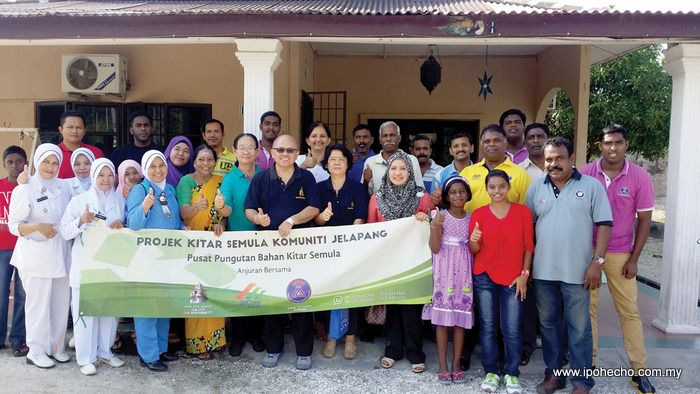Solid Waste Management in Perak


Ipoh Watch
Ipoh was declared a city on May 27, 1988 with the Ipoh City Council or Majlis Bandaraya Ipoh (MBI) headed by a ‘Datuk Bandar’ or mayor administering an area size of 643 sq km and a population of about 720,000 people. It is divided into 23 zones each headed by an appointed councillor and assisted by two officers from MBI, who are normally residents of the zones. With the slogan ‘Ipoh Bersih Hijau dan Membangun’ it strives to make Ipoh a liveable city.
In April 2014, Ipoh was ranked by the US News as one of the nine best places to retire in the world. It declared Ipoh as the world’s third most affordable city after Vietnam and Thailand.
However, many Ipohites are also unhappy with the services rendered by MBI, especially those related to garbage, uncut grass and unclean drains. Residents fear the spread of dengue, as a result. Many have voiced their complaints through MBI’s hotline and Whatsapp while some brought their predicament to their respective councillors and the media.
Mayor Dato’ Harun Rawi recently announced that Ipoh City Council had received 6310 complaints from the public on various issues for the first quarter of this year. Of this 1263 complaints were on illegal dumpsites, farm wastes and dirty drains. The mayor too announced that 5179 or 82.4% of the complaints had been acted upon. On behalf of Ipoh City Watch, I wish to congratulate the mayor and MBI for having achieved their Key Performance Indicator (KPI) of minimum 80% set.
However, we are not sure if the 1629 illegal dumpsites identified at end 2014 have been reduced. This is not to say MBI has not taken action. Some of the problems lie with the perpetrators. MBI should also look into its KPI for enforcement to ensure that the perpetrators are caught and punished to deter others from doing the same.


Having a fixed schedule for garbage collection will help reduce the illegal dumpsites. The Council should also provide garbage bins to residents or enforce a ruling to have residents and business premises to provide their own. Rating by MBI and the health department on eateries should consider garbage disposal and separation of solid waste as criteria.
According to Solid Waste Corporation, each resident generates about 0.7kg solid waste per day. Thus the amount of solid waste generated by the 720,000 Ipohites is about 504,000kg. Based on the recycle rate of about 10%, about 453,600kg x 30 or 13,608 tonnes of solid waste produced each month will end up at illegal dumpsites or the only landfill in Ulu Johan.
Managing the disposal of solid waste by MBI is no easy task, as it involves technical, financial, institutional, economic and social constraints. Thus it is not surprising to see that the number illegal dumpsites will continue to rise until and unless the solid waste is managed properly and people start to change their perception on garbage separation and recycling.
Privatisation of solid waste looks imminent in Perak, one of the two states in the Northern region besides Penang, which has not accepted the terms and conditions stipulated in the agreement to have E-Idaman, the concession company appointed to manage solid waste in Perak. The concessionaire will be monitored by Perak SWCorp pursuant to the Solid Waste and Public Cleansing Management Act 2007 (Act 672) which was gazetted on August 30, 2007 and enforced on September 1, 2011.
Under the agreement, E-Idaman will take over the solid waste management responsibility from all 15 local councils in Perak. It includes the collection and disposal of garbage, grass cutting, cleaning of drains and providing garbage bins to all residents.
As President of Ipoh City Watch, I am urging the state government to hasten the negotiation process so that Ipohites and Perakeans can enjoy a cleaner and efficient disposal of solid waste.
I visited Langkawi two months ago to see how E-Idaman keeps the island clean. It was so different. I could hardly find any illegal dumpsites. Garbage bins were seen almost every 50m in the town centre. Local councils in Perak can continue playing other roles more effectively developing each area, reduce crime, improve transportation and business opportunity and increase employment rate. These are variables that make Melbourne the most liveable city in the world and Ipoh can achieve that status too in years to come.
Ipoh City Watch is developing a community recycling model involving 250 houses in Jelapang Tambahan with the cooperation of Rukun Tetangga Jelapang and assisted by Perak SWCorp. The project, which began in April, has produced very encouraging results. Some 1376kg or 12.3% garbage has been salvaged from landfill and illegal dumpsites within a period of nine weeks. The success of this model will be shared with other communities so that by 2020 we can help recycle at least 22% of the garbage nationwide.
Dr Richard Ng


